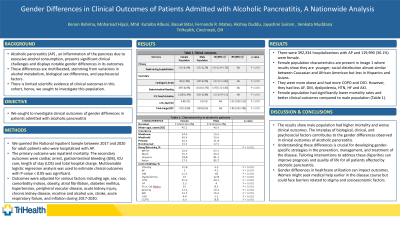Tuesday Poster Session
Category: Biliary/Pancreas
P3480 - Gender Differences in Clinical Outcomes of Patients Admitted With Alcoholic Pancreatitis: A Nationwide Analysis
Tuesday, October 29, 2024
10:30 AM - 4:00 PM ET
Location: Exhibit Hall E

Has Audio

M Kenan Rahima, MD
TriHealth Good Samaritan Hospital
Cincinnati, OH
Presenting Author(s)
M Kenan Rahima, MD1, Bassel Bitar, MD1, Mohamad Hijazi, MD1, Mhd Kutaiba Albuni, MD2, Fernando R.. Mateo, MD3, Akshay Duddu, MD4, Jayashrei Sairam, MD4, Venkata Muddana, MD5
1TriHealth Good Samaritan Hospital, Cincinnati, OH; 2TriHealth, Doha, Ad Dawhah, Qatar; 3Trihealth, Cincinnati, OH; 4Greater Baltimore Medical Center, Towson, MD; 5TriHealth, Cincinnati, OH
Introduction: Alcoholic pancreatitis, an inflammation of the pancreas due to excessive alcohol consumption, presents significant clinical challenges and displays notable gender differences in its outcomes. These differences are multifaceted, stemming from variations in alcohol metabolism, biological sex differences, and psychosocial factors. There is limited scientific evidence of clinical outcomes in this cohort, hence, we sought to investigate this population.
Methods: We queried the National Inpatient Sample between 2017 and 2020 for adult patients who were hospitalized with AP. The primary outcome was inpatient mortality. The secondary outcomes were cardiac arrest, gastrointestinal bleeding (GIB), ICU care, length of stay (LOS), and total hospital charge. Multivariable logistic regression analysis was used to estimate clinical outcomes with a P-value < 0.05 was significant. Outcomes were adjusted for various factors including age, sex, race, comorbidity indices, obesity, atrial fibrillation, diabetes mellitus, hypertension, peripheral vascular disease, acute kidney injury, chronic kidney disease, nicotine and alcohol use, stroke, acute respiratory failure, and inflation during 2017-2020.
Results: There were 392,334 hospitalizations with AP and 119,990 (30.1%) were female. Female population characteristics are present in Image 1 where results show they are younger; racial distribution is almost similar between Caucasians and African Americans but less in Hispanics and Asians. They were more obese and had more COPD and CKD. However, they had less AF, DM, dyslipidemia, HTN, HF, and AKI. The female population had significantly lower mortality rates and better clinical outcomes compared to the male population (Table 1).
Discussion: The results show male population had higher mortality and worse clinical outcomes. The interplay of biological, clinical, and psychosocial factors contributes to the gender differences observed in clinical outcomes of alcoholic pancreatitis. Understanding these differences is crucial for developing gender-specific strategies in the prevention, management, and treatment of the disease. Tailoring interventions to address these disparities can improve prognosis and quality of life for all patients affected by alcoholic pancreatitis. Gender differences in healthcare utilization can impact outcomes. Women might seek medical help earlier in the disease course but could face barriers related to stigma and socioeconomic factors.

Note: The table for this abstract can be viewed in the ePoster Gallery section of the ACG 2024 ePoster Site or in The American Journal of Gastroenterology's abstract supplement issue, both of which will be available starting October 27, 2024.
Disclosures:
M Kenan Rahima, MD1, Bassel Bitar, MD1, Mohamad Hijazi, MD1, Mhd Kutaiba Albuni, MD2, Fernando R.. Mateo, MD3, Akshay Duddu, MD4, Jayashrei Sairam, MD4, Venkata Muddana, MD5. P3480 - Gender Differences in Clinical Outcomes of Patients Admitted With Alcoholic Pancreatitis: A Nationwide Analysis, ACG 2024 Annual Scientific Meeting Abstracts. Philadelphia, PA: American College of Gastroenterology.
1TriHealth Good Samaritan Hospital, Cincinnati, OH; 2TriHealth, Doha, Ad Dawhah, Qatar; 3Trihealth, Cincinnati, OH; 4Greater Baltimore Medical Center, Towson, MD; 5TriHealth, Cincinnati, OH
Introduction: Alcoholic pancreatitis, an inflammation of the pancreas due to excessive alcohol consumption, presents significant clinical challenges and displays notable gender differences in its outcomes. These differences are multifaceted, stemming from variations in alcohol metabolism, biological sex differences, and psychosocial factors. There is limited scientific evidence of clinical outcomes in this cohort, hence, we sought to investigate this population.
Methods: We queried the National Inpatient Sample between 2017 and 2020 for adult patients who were hospitalized with AP. The primary outcome was inpatient mortality. The secondary outcomes were cardiac arrest, gastrointestinal bleeding (GIB), ICU care, length of stay (LOS), and total hospital charge. Multivariable logistic regression analysis was used to estimate clinical outcomes with a P-value < 0.05 was significant. Outcomes were adjusted for various factors including age, sex, race, comorbidity indices, obesity, atrial fibrillation, diabetes mellitus, hypertension, peripheral vascular disease, acute kidney injury, chronic kidney disease, nicotine and alcohol use, stroke, acute respiratory failure, and inflation during 2017-2020.
Results: There were 392,334 hospitalizations with AP and 119,990 (30.1%) were female. Female population characteristics are present in Image 1 where results show they are younger; racial distribution is almost similar between Caucasians and African Americans but less in Hispanics and Asians. They were more obese and had more COPD and CKD. However, they had less AF, DM, dyslipidemia, HTN, HF, and AKI. The female population had significantly lower mortality rates and better clinical outcomes compared to the male population (Table 1).
Discussion: The results show male population had higher mortality and worse clinical outcomes. The interplay of biological, clinical, and psychosocial factors contributes to the gender differences observed in clinical outcomes of alcoholic pancreatitis. Understanding these differences is crucial for developing gender-specific strategies in the prevention, management, and treatment of the disease. Tailoring interventions to address these disparities can improve prognosis and quality of life for all patients affected by alcoholic pancreatitis. Gender differences in healthcare utilization can impact outcomes. Women might seek medical help earlier in the disease course but could face barriers related to stigma and socioeconomic factors.

Figure: Clinical Characteristics
Note: The table for this abstract can be viewed in the ePoster Gallery section of the ACG 2024 ePoster Site or in The American Journal of Gastroenterology's abstract supplement issue, both of which will be available starting October 27, 2024.
Disclosures:
M Kenan Rahima indicated no relevant financial relationships.
Bassel Bitar indicated no relevant financial relationships.
Mohamad Hijazi indicated no relevant financial relationships.
Mhd Kutaiba Albuni indicated no relevant financial relationships.
Fernando Mateo indicated no relevant financial relationships.
Akshay Duddu indicated no relevant financial relationships.
Jayashrei Sairam indicated no relevant financial relationships.
Venkata Muddana indicated no relevant financial relationships.
M Kenan Rahima, MD1, Bassel Bitar, MD1, Mohamad Hijazi, MD1, Mhd Kutaiba Albuni, MD2, Fernando R.. Mateo, MD3, Akshay Duddu, MD4, Jayashrei Sairam, MD4, Venkata Muddana, MD5. P3480 - Gender Differences in Clinical Outcomes of Patients Admitted With Alcoholic Pancreatitis: A Nationwide Analysis, ACG 2024 Annual Scientific Meeting Abstracts. Philadelphia, PA: American College of Gastroenterology.
